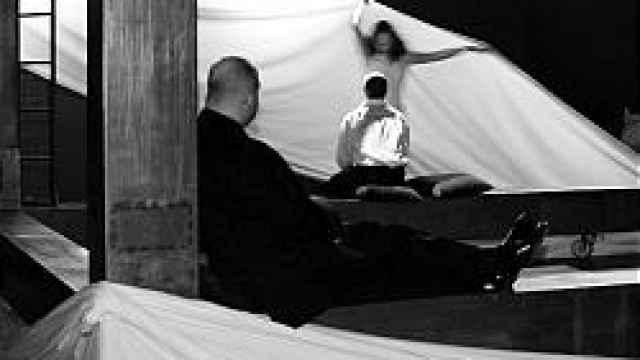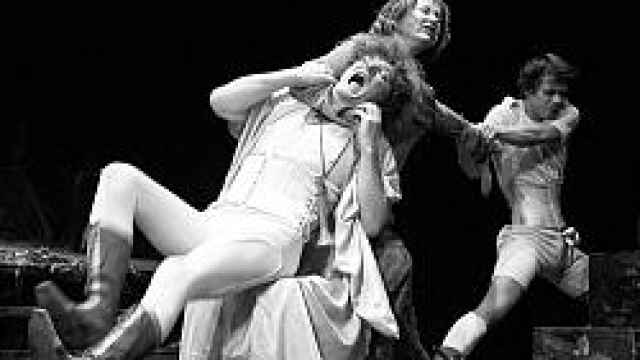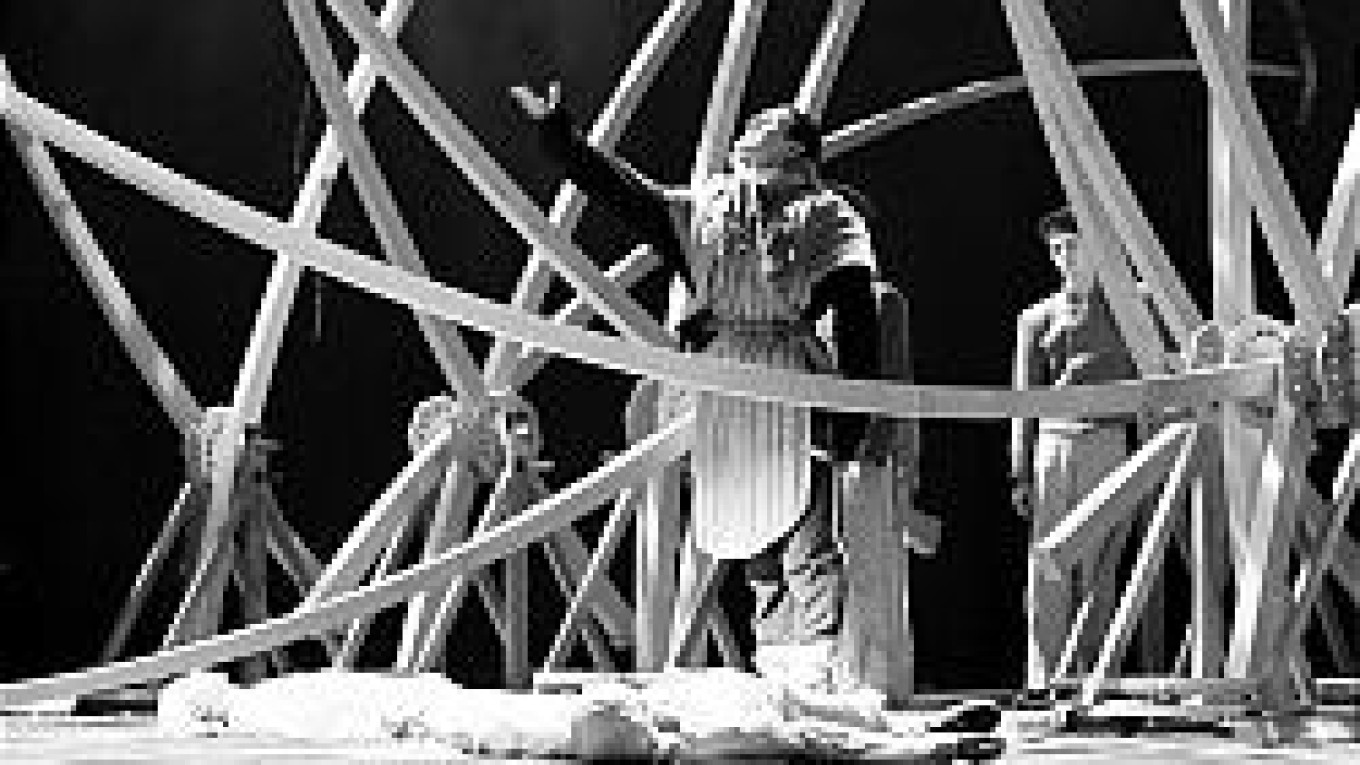Here it is, my last salvo until we start again from scratch in September -- the honest-to-goodness lowdown on what really happened in Moscow during the 2002 season.
The New Status Symbol: A new play in your portfolio. Forget Versace, forget Botox. If you work in the theater in Moscow these days and you want people to stand up and take notice, you find a new play to stage or act in. If you're a spectator who wants to be ahead of the curve, you go down to see what new plays are coming up. My conservative count put the number of new plays produced this season at more than 60. The most I had ever counted since the fall of the wall was 35. It's boom time for new plays.
Trend of the Year: Stabilization. This was a season in which previous trends hit the mainstream. The explosion of interest in new plays was one such trend. Another was the coming-of-age of a new generation of young directors who had indicated over the last few years that they were ready to make their mark. Kirill Serebrennikov ("Terrorists" at the Chekhov Art Theater) and Nina Chusova ("MotherFatherSonDog" at the Sovremennik) are the new It Kids leading the Moscow version of the Brat Pack. Their work may occasionally suffer from being overly slick and too eager to be hip, but these artists have found an audience, no doubt about it.
Best Director's Debut: Pavel Safonov. This young man is already a step and a half from taking his place in the Brat Pack. His sensitive and ironic student production of Ivan Turgenev's "A Month in the Country" at the Shchukin Institute in the winter clearly indicated a new talent was on the rise. When he mounted his professional debut at the end of the season on the small stage of the Vakhtangov Theater with a strong and perceptive handling of Anton Chekhov's "The Seagull," a new career had already been launched.
Guest of Honor: Norman Mailer. What a strange thing it was, a one-off reading of a stilted play based on the correspondence of Ernest Hemingway, F. Scott Fitzgerald and Zelda Fitzgerald that featured George Plimpton as F. Scott, Mailer as Ernest and his wife Norris Church Mailer as Zelda sitting at tables at the Helikon Theater reading their parts. It probably should have been a bust but it wasn't, thanks to Mailer, who wore his fame, his cantankerousness, his wit, his intellect, his talent and his down-to-earth common sense with genuine panache.
Systems Failure: "Othello," a production of Bokovfactory and the Praktika Theater Group. A big movie director (Alexander Zeldovich of "Moskva" fame) gathered a crew of stars -- including Grigory Siyatvinda, Moscow's brilliant actor of African descent -- to perform William Shakespeare's wrenching exploration of passion and tragedy and they made a muddle of it. Yawns in place of passion; snores in place of tragedy.
 Vladimir Lupovskoi / For MT Playwriting duo the Presnyakov Brothers brought us "Captive Spirits" this winter. | |
Mr. Grumpy: Mikhail Levitin; and you've got to love grumps like this. In his production of "Under the Bed" based on Fyodor Dostoevsky's story "Wife of Another and a Husband Under the Bed," Levitin tossed off one of the crankiest theatrical jokes I have ever seen. He had his actor Arseny Kovalsky walk out on stage and stare defiantly at the bewildered and increasingly restive audience for what seemed like 10 minutes before anything began to happen. MTV this was not, thank God.
Best New Play of the Year: "The Moth" by Pyotr Gladilin, at the Fomenko Studio. This bold, funny, touching and tragic play about a teenage army recruit who turns into a woman overnight in order to avoid combat took me by storm. With most of Moscow's cultural elite hiding their heads in the sand about the complexities of Chechnya, Gladilin served up a trenchant cry for common sense. It? was all the stronger because he made no attempt to push a cause, but rather worked exclusively in nuances and understatement.
Best One-Two Punch: The Presnyakov Brothers from Siberia, Oleg and Vladimir, a playwriting team that turned out two of the season's most talked-about shows: "Terrorism" at the Art Theater and "Captive Spirits" at the Playwright and Director Center.
Most Underrated Show: "How to Find an Honest Woman" at the Vakhtangov. I don't know what happened here, but this often stunning production of Carlo Gozzi's "The King Stag" by Grigory Dityatkovsky was plastered in the press. Take it from me: Don't ever believe a critic who doesn't write for The Moscow Times. This was a beautiful, sensitive and moving production. The fact that the theater even felt compelled to rename it a month after it opened adds another bizarre note to this misunderstood and truncated version of what should have been a success story.
That Indescribable Something: Nikolai Roshchin's "The School of Fools" at the Meyerhold Center. Finding the words to define this strange, engrossing mix of physical, musical, poetic and even puppet and shadow theater -- with forays into painting and opera -- is basically impossible. Like anything genuinely inventive, it had to be seen to be appreciated. Playing a major role in the show's innovations was the music by Stefan Andrusenko.
Mr. Unpredictable: Kama Ginkas, who has achieved international fame by catching people off-guard and delivering what they least expect. His production of "Dreams of Exile" at the Theater Yunogo Zritelya this year was more of the same, by which I mean to say it was Ginkas veering off suddenly and taking us into new territory with a theatrical interpretation of themes drawn from the painting of Marc Chagall. Alternately hilarious and devastating, it was great theater because it was filled to the brim with paradoxes and surprises.
The Teflon Man: Maxim Kurochkin. This unique young writer is prodigiously off the wall. That along with his insight, sensitivity, intelligence, humor and capacity for the epic, is what makes him great, as we saw in most of the four plays he had produced this year. But what can we say about "Imago," his restructuring of George Bernard Shaw's "Pygmalion"? Directed by Nina Chusova and produced by Face Fashion and Pavel Kaplevich, this was a train wreck of overkill and posturing. But you know what? Nobody cared. Kurochkin came out of it even more trendy and famous than going in.
The Teflon Woman: Chulpan Khamatova in "MotherFatherSonDog" (at left) at the Sovremennik. I thought this production made a lot of noise for the little bit of substance it had. But Khamatova, raucously playing an 8-year-old boy with ears the size of a baby elephant's, was absolutely divine.
 Vladimir Lupovskoi / For MT Despite its star-filled cast and movie industry director, the Bokovfactory and Praktika Theater Group's production of "Othello" was not worthy of William Shakespeare. | |
Confusion Reigns: "King Lear" at the Mossoviet Theater. This garish, jarring production by Pavel Khomsky was a merciless stew of rap and pop music, cheap stabs at erotica and a few scenes of powerful dramatic acting by Mikhail Kozakov in the title role. Enough to make anyone abandon their kingdom and head for cover.
Finest About-Face: Dmitry Krymov, who at age 49 and after more than 25 years as a respected designer made his directing debut with "Hamlet" at the Stanislavsky Theater. In this penetrating, affecting work, Krymov "buried" himself as designer, employing an essentially empty stage, and gave birth to a director of taste and talent.
Mr. Impeccable: Konstantin Raikin, whose production of Alexander Ostrovsky's "A Profitable Post" at the Satirikon Theater was a spectacular lesson in how to take a musty classic and turn it into a compelling, gripping, modern theatrical experience.
The Hot Style: Recalibrated mythology. Writers increasingly are restructuring old myths to create new ones for the present. We saw that in Ugarov's "Oblomov" (based on a classic 19th-century literary character), The Presnyakov Brothers' "Captive Spirits" (about famous Russian poets), Viktor Korkiya's "A Devilish Comedy" ("Don Juan" reconsidered), Kurochkin's "Imago" and "In the Retina" (an adaptation of an old short story), Oleg Shishkin's "Anna Karenina 2" (a sarcastic horror-story based on Tolstoy's heroine) and many more.
Birthday Boy: Yury Lyubimov, who turned 85 on Sept. 30 and celebrated by premiering his 101st show in his 38-year directing career -- an interpretation of both parts of Goethe's "Faust." I would not count this show among his best work even of the last decade, but what a thrill to see a living legend continue to push himself in new directions.
 "> Vladimir Lupovskoi / For MT Vladimir Simonov and Anastasia Vertinskaya starred in the disappointing "Imago," by popular playwright Maxim Kurochkin. | |
Marathon Man: The great Lithuanian director Eimuntas Nekrosius, who briefly drew back the curtain on his latest production, Chekhov's "The Cherry Orchard," last week. This show, which will enter the Moscow repertory next season and will travel the world to festivals wherever they can be found, ran over six -- count 'em -- six hours, and still wowed the crowds.
Man and Woman of the Year: Mikhail Ugarov and Yelena Gremina. The prodigious efforts of this husband and wife team to promote new dramatic writing are enough to make us wonder if there really are happy endings every now and then. Ugarov and Gremina have spent more than half a decade organizing seminars, heading up workshops, offering advice, cajoling producers, setting up international projects and, in general, leading the crusade to promote new writing. The theater they founded last year, Teatr.doc, began turning out numerous productions this year -- led by Ivan Vyrypayev's "Oxygen," an effective piece about the difficult world young people are entering these days. Ugarov and Gremina symbolize the rebirth of new writing in Russia today.
A Message from The Moscow Times:
Dear readers,
We are facing unprecedented challenges. Russia's Prosecutor General's Office has designated The Moscow Times as an "undesirable" organization, criminalizing our work and putting our staff at risk of prosecution. This follows our earlier unjust labeling as a "foreign agent."
These actions are direct attempts to silence independent journalism in Russia. The authorities claim our work "discredits the decisions of the Russian leadership." We see things differently: we strive to provide accurate, unbiased reporting on Russia.
We, the journalists of The Moscow Times, refuse to be silenced. But to continue our work, we need your help.
Your support, no matter how small, makes a world of difference. If you can, please support us monthly starting from just $2. It's quick to set up, and every contribution makes a significant impact.
By supporting The Moscow Times, you're defending open, independent journalism in the face of repression. Thank you for standing with us.
Remind me later.


